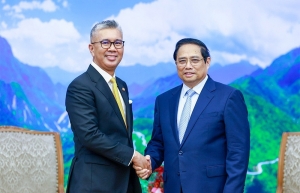Malaysia unveils large-scale Semiconductor IC Design Park
| Malaysian Economy Minister Rafizi Ramli (R) at the launch ceremony of the country’s Semiconductor IC Design Park in Puchong on August 6. (Photo: Bernama) |
Kuala Lumpur - Malaysia needs to focus on developing its own semiconductor design capabilities, lessening dependence on imported chips moving forward, said Malaysian Economy Minister Rafizi Ramli at the launch ceremony of the country’s Semiconductor IC Design Park in Puchong on August 6.
As reported by the Malaysian national news agency Bernama, Rafizi said the federal government’s strategic direction is to enhance the entire semiconductor ecosystem, covering both upstream and downstream sectors, particularly emphasising original design manufacturers (ODM).
“The interest in data centres will continuously drive the demand for semiconductors, and this presents opportunities because there is demand for chips,” he said as quoted by Bernama. “As this ecosystem takes place, data centres in Malaysia will begin to consider “Made by Malaysia” chips. That is the consideration the federal government is looking for.”
The official noted the government already has the facilities for mainstream assembly and testing, and the launch of the Malaysia Semiconductor IC Design Park is a perfect mechanism for multiplying the number of IC design companies as much as possible.
The park will be equipped with common public service tools and facilities, including affordable electronic design automation tools, servers, IP, multi-project wafer services, and training programmes. Its primary goal is to promote original design manufacturing, encouraging local involvement in product design, prototyping, and production.
The park will be able to house more than 400 IC Design eEngineers and has already been taken up by eight local and international firms from MaiStorage, Skyechip, Weeroc, and AppAsia. Other partners include Bluechip VC, Cadence Design System, Synopsys, Siemens EDA, Keysight, and ARM.
 | Malaysia's Leader Energy secures HSBC deal for its Vietnam portfolio Leader Energy has signed a VND593 billion ($23.3 million) financing deal with HSBC to facilitate the development of solar projects in Vietnam. |
 | Trading possibilities expand with Malaysia Vietnam and Malaysia are working to amplify their trade, backed by the latter’s investment increase into the former. |
 | Malaysia, Singapore offer unique approaches to cryptocurrency supervision: experts The growth of financial technologies, including blockchains and cryptocurrencies, depends on how well the legal system can adapt. Globally, as the legal status of cryptocurrencies remains ambiguous, Malaysia and Singapore offer unique approaches to cryptocurrency supervision. |
What the stars mean:
★ Poor ★ ★ Promising ★★★ Good ★★★★ Very good ★★★★★ Exceptional
Related Contents
Latest News
More News
- France supports Vietnam’s growing role in international arena: French Ambassador (January 25, 2026 | 10:11)
- Foreign leaders extend congratulations to Party General Secretary To Lam (January 25, 2026 | 10:01)
- Russian President congratulates Vietnamese Party leader during phone talks (January 25, 2026 | 09:58)
- Worldwide congratulations underscore confidence in Vietnam’s 14th Party Congress (January 23, 2026 | 09:02)
- Political parties, organisations, int’l friends send congratulations to 14th National Party Congress (January 22, 2026 | 09:33)
- 14th National Party Congress: Japanese media highlight Vietnam’s growth targets (January 21, 2026 | 09:46)
- 14th National Party Congress: Driving force for Vietnam to continue renewal, innovation, breakthroughs (January 21, 2026 | 09:42)
- Vietnam remains spiritual support for progressive forces: Colombian party leader (January 21, 2026 | 08:00)
- Int'l media provides large coverage of 14th National Party Congress's first working day (January 20, 2026 | 09:09)
- Vietnamese firms win top honours at ASEAN Digital Awards (January 16, 2026 | 16:45)

 Tag:
Tag:
















 Mobile Version
Mobile Version